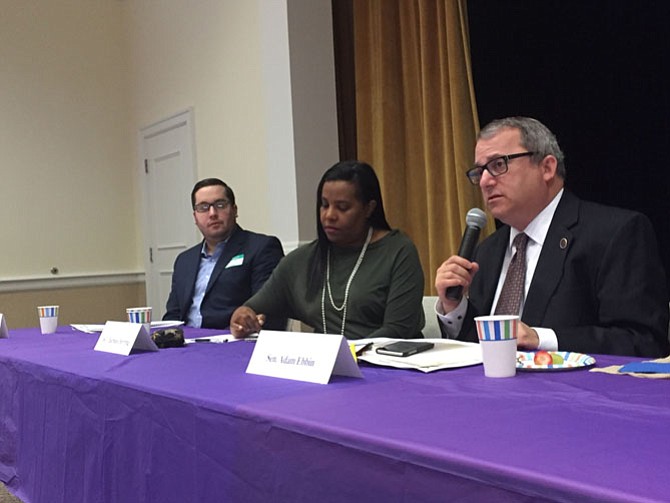State Sen. Adam Ebbin (right) tells elderly residents in Arlington that the state legislature will unlikely meet funding requests made by the Northern Virginia Aging Network. Del. Charniele Herring (center) encouraged citizens to travel to Richmond to support legislation that affects elderly populations. Photo by Vernon Miles.
The Legislative Forum on Aging was themed as a fireside chat with the elected representatives, something Carol Downs, chair of the Northern Virginia Aging Network (NVAN), joked she could remember. She wouldn’t have been alone; most of the citizens in the room were elderly residents of nearby Arlington and Alexandria neighborhoods who came out to the Fairlington Community Center to discuss issues related with aging on Nov. 14.
According to the census bureau, 9.5 percent of Arlington residents are over 65. According to data collected by Health Systems Agency of Northern Virginia, residents over 65 are the most rapidly growing age demographic in the region.
“[The over 65 population] will continue to grow rapidly [in Northern Virginia], at a faster rate, than the Virginia and U.S. older populations over the next two decades,” according to a Health Systems Agency report. “By 2030, there will be about 430,000 Northern Virginians, more than 15 percent of the population, 65 years of age and older.”
As residents spoke with state Sen. Adam Ebbin and Del. Charniele Herring, one of the major themes that emerged was the intersection between aging-related issues and other problems in Virginia, like declining health care accessibility, affordable housing, and prison reform.
The event, hosted by NVAN, compiled a list of three legislative priorities for 2017, three budget priorities, and a list of ongoing concerns.
Among the legislative priorities, most centered around promoting a broader and more qualified medical workforce. Under budget priorities, the group advocated for appropriating $2.1 million to meet the state standard of one full-time ombudsman for every 2,000 nursing homes and assisted living beds. Ombudsmen provide counseling and information to elderly citizens with concerns about their care. Currently, Downes said the state has roughly one full-time ombudsman for every 5,000 nursing home beds. NVAN also pushed to expand Medicaid to provide access to healthcare for up to 400,000 Virginians, including 62,000 older adults.
“It’s a perfect storm,” said Patrick Killane, a local resident. “We have more older people needing medical care, and workforce that is currently undercompensated which makes it difficult to attract and maintain workers. At the same time, long-term care is the fastest growing component of Medicaid and Medicaid is the fastest growing item in the state budget. It’s squeezing out education and other issues from the budget.”
But Ebbin and Herring were also quick to emphasize that, with the state facing a budget deficit, any statewide funding for priorities that will add to the budget are unlikely. Herring also said the state legislature's Republican majority follow what she called a Yellow Pages rule.
“If you can open up the Yellow Pages and find a related job to the field,” Herring said, “their view then is that it doesn’t need to be legislated.”
This answer was frustrating for many in the audience.
“I see my [taxes] go up every year and I keep hearing that there’s no money,” said Ping McKenna. McKenna said she hoped that even if the state couldn’t consider spending more to help Virginia’s elderly, that it might be able to at least offer tax breaks for those who aren’t working in order to care for elderly family members. However, Herring said legislation offering a tax break would also be unlikely as it would take funding away from the state coffers.
Celeste Taylor, a property manager at independent living community Woodland Hill Apartments, said there is a three- to five-year long waitlist for affordable housing for elderly citizens. According to Celeste, seniors living in Arlington have great difficulty finding housing, and options are further narrowed when trying to find affordable housing.
In advocating for issues related to housing, Ebbin and Herring said the best thing Arlington citizens can do is write in letters to their representatives. Even legislators who already support the issues can share the letters with those who might be on the fence. Herring said the best way of showing support would be going to Richmond on the day bills are being presented. When proposing a bill about studying non-prison alternatives for Virginians arrested on drug offenses, Herring said having police officers show up and stand with her on the stage made the difference. Ebbin encouraged citizens to follow legislation with Lobbyist-In-A-Box, an information system that allows follow-up to five bills through Virginia legislature for free. Ebbin also encouraged citizens to reach out to their legislators for updates regarding bills.
Several citizens said they appreciated hearing how to be involved.
“It was good to hear the ways to be informed about different bills,” said Martha Villanigro-Santiago, an Arlington resident. “It’s encouraging to know how to help. The biggest takeaway, for me, was how to be involved.”
